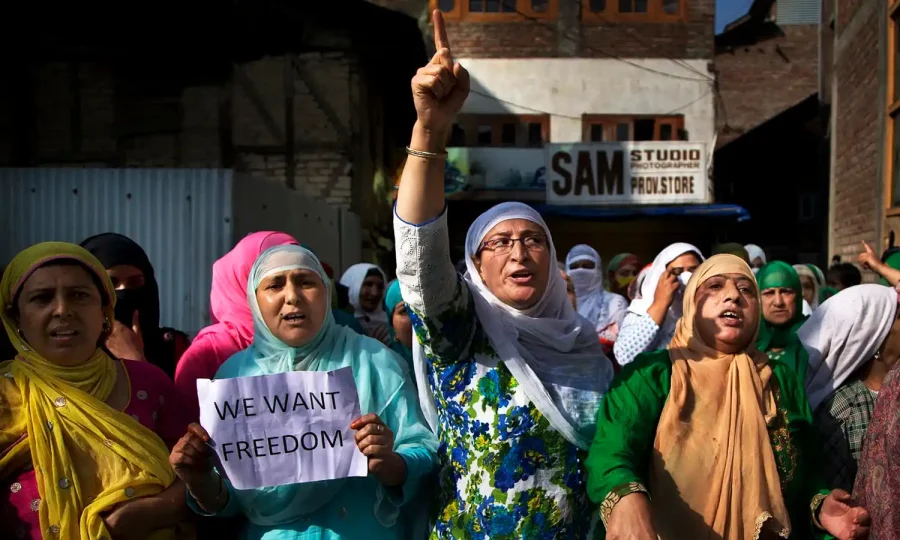In a world grappling with a myriad of challenges, the 10th of December holds a special significance as we commemorate the 75th anniversary of the Universal Declaration of Human Rights (UDHR) and concurrently mark the 30th anniversary of the establishment of the High Commissioner for Human Rights. This year, the theme resonates profoundly: “Consolidating and sustaining human rights culture into the future.” Yet, as we delve into the complexities of the current international landscape, the human rights situation in Indian illegally occupied Jammu and Kashmir (IIOJK) emerges as a poignant focal point, revealing the stark reality that without resolving core conflicts and establishing an equitable international order, the dream of sustainable human rights culture remains elusive.
The picturesque region of Kashmir, nestled between India and Pakistan, has been a crucible of historical tensions and human rights concerns. The breathtaking landscapes belie the underlying turmoil that has persisted for decades. The situation demands not just attention but an urgent call to action, for it serves as a stark reminder that the principles enshrined in the UDHR are not universally experienced.
In the lush valleys and snow-capped peaks of occupied Kashmir, human rights violations have left an indelible mark on the lives of its inhabitants. Reports of arbitrary detentions, restrictions on freedom of expression, and extra-judicial killings have raised international concerns. The right to life, liberty, and security of person, as proclaimed in Article 3 of the UDHR, seems precarious in the shadow of conflict.
Statistics paint a disconcerting picture. According to various human rights organizations, thousands of civilians have lost their lives, and a significant number have been displaced. The region has witnessed a concerning pattern of violence, with reports of torture, disappearances, and gender-based violence adding to the harrowing narrative. The emotional toll on the people of Kashmir is immeasurable, as generations grow up amidst conflict, their daily lives punctuated by uncertainty and fear.
To address the human rights situation in IIOJK, one must confront the underlying core conflict that has fueled decades of unrest. The territorial dispute between India and Pakistan over the region remains a contentious issue, with both countries staking claim to the territory. The protracted conflict has not only resulted in human suffering but has also hindered any meaningful dialogue towards a resolution.
Advocating for change necessitates a re-evaluation of international diplomacy, urging the global community to play a proactive role in facilitating dialogue between the conflicting parties. The principles of self-determination, as outlined in the UDHR, should be upheld, allowing the people of Kashmir to voice their aspirations and determine their political future.
The quest for a sustainable human rights culture in Kashmir, and indeed globally, hinges on the establishment of an equitable international order. The prevailing imbalance in power dynamics often leaves marginalized regions like Kashmir vulnerable to the whims of geo-politics. True consolidation of human rights culture demands a recommitment to principles of justice, equality, and non-discrimination on a global scale.
It is imperative that the international community acknowledges the interdependence of human rights and peace. A holistic approach to conflict resolution, with an unwavering commitment to human rights, is the need of the hour. The High Commissioner for Human Rights must be empowered to play a more assertive role, ensuring that human rights are not sacrificed at the altar of political expediency.
Amidst the challenges that loom large, there is room for hope and change. The anniversary of the UDHR provides an opportune moment for nations to recommit to the principles that underpin human rights. The international community must unite in advocating for a peaceful resolution to the Kashmir conflict, recognizing that the path to sustainable human rights culture begins with justice and dialogue.
Let us not be passive observers to the suffering of the people of Kashmir. Instead, let our collective voice resonate with a call for change. Beyond the statistics and geopolitical intricacies, it is the human stories that compel us to action. The father who longs for a secure future for his children, the woman yearning for justice for her violated rights – these are the narratives that demand and deserve our attention.
In conclusion, the journey towards consolidating and sustaining a human rights culture into the future requires a paradigm shift in our approach to conflict resolution and global governance. The situation in Kashmir serves as a litmus test for the international community’s commitment to upholding the values enshrined in the UDHR. As we commemorate these anniversaries, let us not only reflect on the progress made but also rekindle the spirit of advocacy for change, ensuring that the dream of a sustainable human rights culture is not deferred but embraced with renewed vigor and compassion.
Ayesha Rafiq is perusing Bachelors of Peace and Conflict Studies from NDU and currently she is intern at Kashmir Institute of International Relations.










